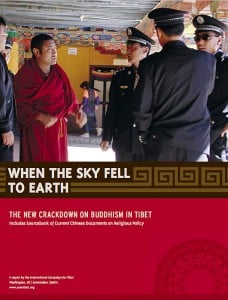 A major new report released by the International Campaign for Tibet reveals the increasing threat to the survival of Tibetan Buddhism in Tibet. ‘When the Sky Fell to Earth: the New Crackdown on Buddhism in Tibet‘ documents the rise in repression of religion in Tibet that is a direct result of China’s economic policies and strategic objectives.
A major new report released by the International Campaign for Tibet reveals the increasing threat to the survival of Tibetan Buddhism in Tibet. ‘When the Sky Fell to Earth: the New Crackdown on Buddhism in Tibet‘ documents the rise in repression of religion in Tibet that is a direct result of China’s economic policies and strategic objectives.
This compelling and authoritative report outlines the impact of official Chinese policy on contemporary Tibetan Buddhist culture through previously unpublished internal government documents and eyewitness reportage.
The 122-page illustrated study demonstrates that many of the controls and restrictions that China has been implementing in recent years have little to do with curbing dissident political activity but are simply aimed at suppressing the growth and strength of religion in Tibet.
Accompanying the report is a Sourcebook of Current Chinese Documents on Religious Policy that provides governments, human rights organizations and academics extensive evidence of changes in religious policy. A video containing recent and rare footage also accompanies the report, graphically illustrating the recent demolition of key monasteries, officials conducting political education sessions in monasteries, official enthronement ceremonies and many other topics in the report.
“China proclaims to be protecting religion and culture in Tibet but its internal documents flatly contradict this and show an intensification of control and repression by the government,” said John Ackerly, President of the International Campaign for Tibet. “We are now seeing a level of government intrusiveness and control over monasteries that was unheard of in the 1980s and early 1990s,” Mr. Ackerly continued.
The 122-page illustrated study demonstrates that many of the controls and restrictions that China has been implementing in recent years have little to do with curbing dissident political activity but are simply aimed at suppressing the growth and strength of religion in Tibet.
‘When the Sky Fell to Earth’ reports that:
- Officials at all levels in Tibet are now being exhorted to strengthen control over monasteries and over the process of identifying reincarnations of important Buddhist monks and nuns.
- Crackdowns on prayer ceremonies for the Dalai Lama and important religious institutions in eastern Tibet in recent years have been described by some Tibetans as being like a ‘second Cultural Revolution.’
- Political education campaigns continue in monasteries and nunneries throughout Tibet, contrary to representations by Chinese officials to Western governments that they have been discontinued.
- The PRC authorities are focusing increasingly on the ‘control’ of religion through administrative and legal mechanisms that enable them to clamp down on religious activities while claiming they are operating according to a ‘rule of law.’
- The atheist Chinese government is taking a more aggressive approach to the identification, enthronement and education of reincarnate lamas following the escape of the 17th Karmapa into exile in 2000.
The enforcement of atheist policies by the Chinese state has created widespread despair among Tibetans in Tibet, as spiritual faith and loyalty to the Dalai Lama are intrinsic elements of Tibetan Buddhist culture. ‘When the Sky Fell to Earth’ details the factors that have led to many thousands of Tibetans escaping into exile in recent years to practise their religion, including: the dearth of senior teachers and scholars inside Tibet; restrictions on the movement of popular religious leaders; virulent political campaigns; the historical legacy of the Cultural Revolution; limitations on numbers of monks and nuns in monasteries and nunneries; and restrictions on pilgrimage.
“Undermining religion in Tibet is a political imperative for today’s China,” said Kate Saunders, a Tibet expert and one of the authors of the report. “The close links between Tibetan identity, sense of nationhood and spiritual faith means that religious practice and devotion are often perceived by Beijing as a threat to the state and to the unity of the PRC, and an obstacle to economic progress,” Ms. Saunders said.
“The result of China’s current policies and practices will be the emasculation of one of the world’s great religious traditions and in its stead a sanitized, superficial set of practices beholden to a communist party,” said Mr. Ackerly.
# # #
The International Campaign for Tibet works to promote human rights and democratic freedoms in Tibet. Founded in 1988, ICT is a non-profit membership organization with offices in Washington, Amsterdam and Berlin.
Sourcebook of Current Chinese Documents on Religious Policy: The report includes the Sourcebook (pages 89 – 122) which has lengthy excerpts of four key documents. Translations of the entire documents are available upon request from ICT.
Companion Film: “Devotion and Defiance – Buddhism and the Struggle for Religious Freedom in Tibet” (USA, 2004, 35 minutes). Produced by the International Campaign for Tibet. Contains rare footage shot in Tibet in the last three years. Available to the media in DVD, VHS and PAL.

